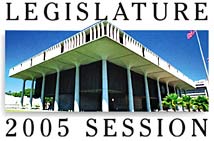Assault on ref
may become felony
Legislators hear debate over
whether to stiffen penalties for
attacks on sports-contest officials
State lawmakers are considering whether to make assault of an athletic contest official a felony offense, but one senator says the growing number of such cases in Hawaii and elsewhere may be indicative of a larger social problem that can't easily be solved through legislation.
|
|
The Senate Judiciary Committee took no action yesterday on the proposal to stiffen penalties for assaulting a referee or other athletic contest officials. In minor assaults, a person is usually charged with a misdemeanor offense, punishable by up to a year in prison. But the bill would make the crime a Class C felony, punishable by up to five years in prison.
Hanabusa said she wanted to study the issue more, adding that she would consider the formation of a task force to determine whether professions that deal with the public -- including referees -- deserve additional protection under the law. It already is a Class C felony to assault an education or corrections worker.
"It's difficult to say one group is more important than another group," said Hanabusa (D, Nanakuli-Makua).
The issue of protecting athletic officials has gained momentum since Feb. 9, when a Big Island high school basketball player charged at a referee after being ejected from a game in an incident that was videotaped and played on local TV news broadcasts.
Kainoa Abril, the 18-year-old Konawaena High player, was dismissed from the team and barred from participating in any sports for the rest of this year. A police investigation is pending into criminal charges filed by referee Mason Souza.
Among those who supported the assault bill was Raymond Kaleo Benz, a soccer referee who was charged at by a player and knocked to the ground from behind after a game in February 2003.
Benz said he filed a formal complaint, but no assault charges were pursued against the high school player because the referee wasn't injured.
"These assaults are a form of workplace violence for those of us who are referees," Benz told lawmakers. "Please pass this law and send a strong message to people who are violent that there will be consequences for their behavior."
Opponents of the bill included the state Office of the Public Defender, which said the bill would unfairly punish "some of our outstanding athletes and children."
"These same individuals are under tremendous pressure because of the inordinate emphasis that our society places upon winning in sports," the Public Defender's Office said. "Most often, the participants are reacting to the pressures we have created and they have become the unfortunate vehicle for our aspirations."
Other supporters included many of Benz's fellow referees from other sports, the Department of Education, the Hawaii High School Athletic Association and Honolulu Prosecutor Peter Carlisle.
City Councilman Todd Apo, a former Kamehameha Schools coach who also has officiated men's and women's college basketball, said referees should be afforded the same protection as teachers because they play a role in educating youth on winning, losing, sportsmanship and fair play.
"We are part of the educational process," he said. "We are the authoritative figure that's part of that education."
[News] [Business] [Features] [Sports] [Editorial] [Do It Electric!]
[Classified Ads] [Search] [Subscribe] [Info] [Letter to Editor]
[Feedback]

